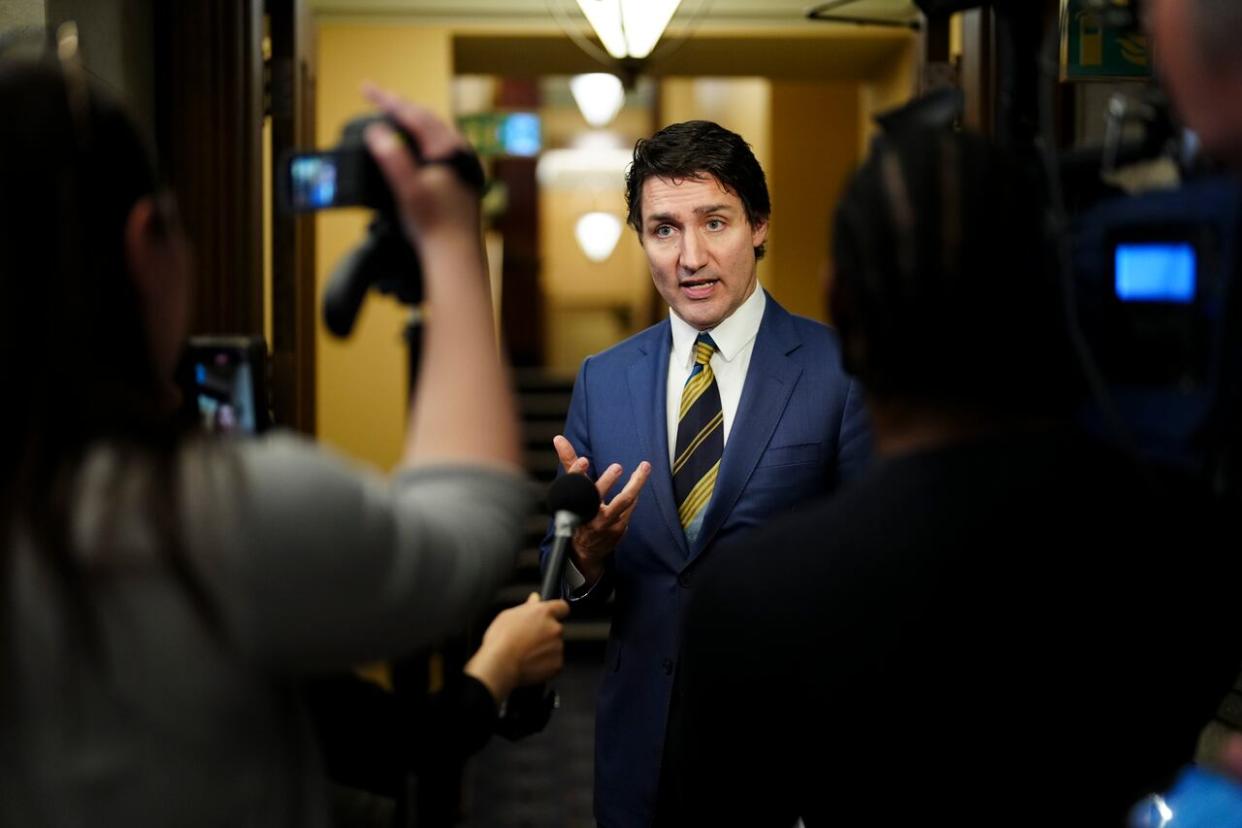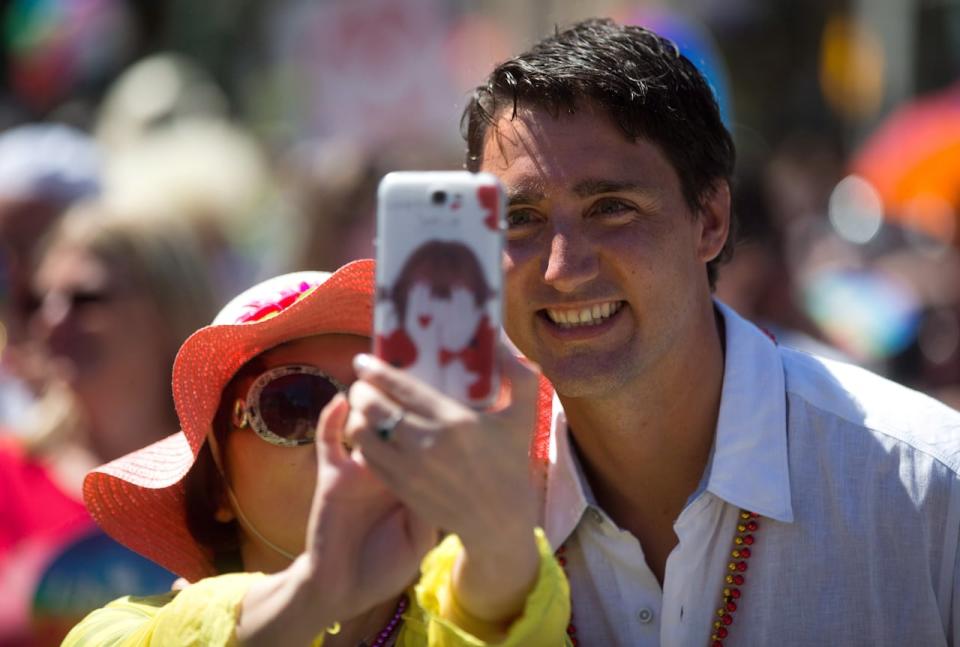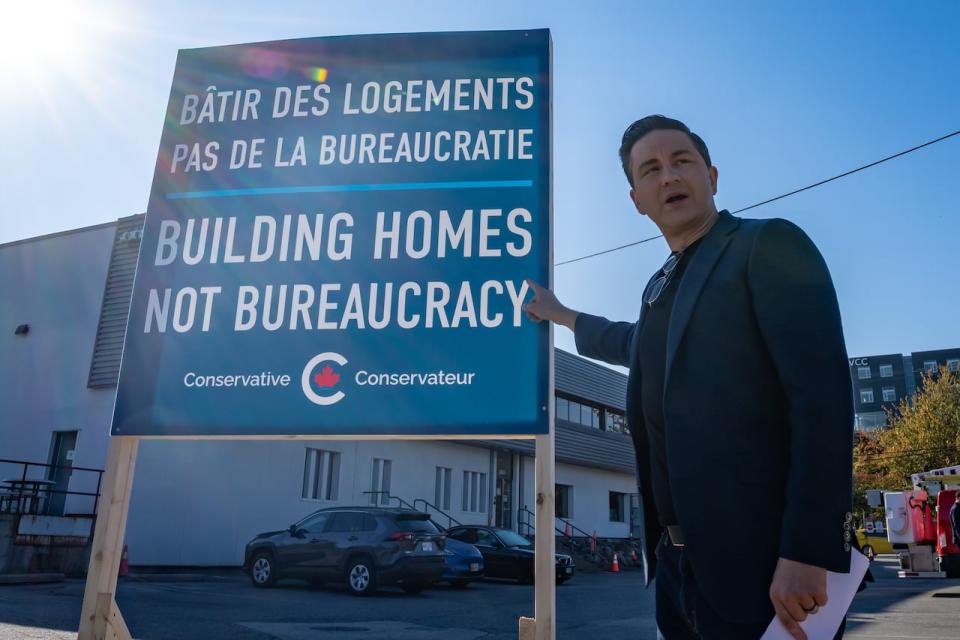Trudeau goes into 2024 in dire need of a better story to tell

- Oops!Something went wrong.Please try again later.
- Oops!Something went wrong.Please try again later.
- Oops!Something went wrong.Please try again later.
The memo sent to staff in the Prime Minister's Office to announce the hiring of Max Valiquette as the government's new executive director of communications said the former marketing executive would be focused on, among other things, "aligning the entire team under a clear narrative."
In politics, a clear narrative isn't everything, but it's a lot. And at least one of the reasons for the Liberal government's struggles in 2023 might be that Justin Trudeau's side lacked a compelling narrative — a tidy story to tell about itself and the country — or didn't do enough to be heard.
There are very real problems abroad in the land that might explain why popular sentiment toward Trudeau and the Liberals has eroded over the past year, and why opinion polls this fall gave the Conservative Party the biggest advantage it has enjoyed since Trudeau became leader of the Liberal Party more than a decade ago.
Though the pandemic — arguably the hardest three years for Canadians since the Second World War — officially came to an end in May, it has not given way to a golden new dawn.
Inflation has cooled considerably from its high point in 2022, but it is still higher than most Canadians are used to and the impact of that peak still lingers. Interest rates have risen as a consequence of the Bank of Canada's attempts to quell inflation. With construction failing to keep pace with demand, the cost of housing has surged. And the opioid epidemic persists.
Canadians have reasons to feel worried or frustrated — although the extent of that downturn in the national mood might still be surprising.
In 2014, a year before Trudeau came to office, Pollara found that 45 per cent of Canadians were optimistic about the future of the middle class. Two years ago, in the midst of the pandemic, that figure was at 53 per cent.

A woman uses her phone to take a photo of herself with Liberal Leader Justin Trudeau during the Vancouver Pride Parade in Vancouver, B.C. on August 3, 2014. (Darryl Dyck/The Canadian Press)
But when Pollara (whose chief strategy officer is Dan Arnold, Trudeau's former pollster) asked the question again this November, just 31 per cent said they were optimistic.
Beyond inflation, interest rates and the real estate market, there might be other reasons to worry about the future. The threat of climate change is now alarmingly apparent — 2023 should be remembered for the record-smashing wildfires and the smoke that shrouded the sun and poisoned the air.
The United States, our loud neighbour, remains riven by political turmoil — dysfunction that threatens the basic tenets of that country's democracy.
But whatever the exact reasons for that waning optimism, those numbers pose a daunting political challenge for a prime minister who made a focus on the middle class a central part of the agenda he brought to office in 2015. When voters are dealing with real problems, it can also be a lot harder to tell them an optimistic story — especially if you've already been in office for eight years
The political power of a good narrative
Conservative Leader Pierre Poilievre is a skilled storyteller. He looks upon the public's frustrations and offers a simple narrative: everything is bad, it's all Justin Trudeau's fault and under a Conservative government things will cost less.
If voters are mad about grocery bills or merely tired of Justin Trudeau, that message might be enough on its own to secure victory. After testing the Conservative Party's television ads with focus groups, one pollster concluded that Poilievre's party, like the Liberal Party in 2015, is becoming the "party of hope."

Conservative Leader Pierre Poilievre takes part in a press event in Vancouver. B.C. on Sept. 14, 2023. (Ethan Cairns/Canadian Press)
When there are very real issues at play, it might seem trite to think about narrative. The idea of a narrative fits more comfortably with fiction than non-fiction. It can be concocted or contrived, manipulated or manipulative. It is not necessarily anchored in the truth.
And journalists and pundits probably pay too much attention to things like narrative, messaging and all the other concepts that can be filed under the broad heading of "communications."
But the best narratives are anchored in something true. And amid the cacophony and happenstance of life, stories are necessary and powerful.
The Liberals came to office in 2015 with a series of messages — real change, better is always possible, sunny ways — that added up to a winning narrative. Trudeau, they said, was ready to lead a different kind of government that would do more to support and expand the middle class.
But it's a lot easier to craft and maintain a narrative when you're sitting on the opposition side of the House of Commons. Once in government, you are subject to the whims of domestic and global affairs — and the demand that you back up your story with action.
The pressure of events
Much of the spring of 2023 in Ottawa was consumed by allegations about foreign interference by agents of the Chinese government, along with the botched appointment of David Johnston as a special rapporteur tasked with looking into those reports (an inquiry will finally begin in January). Then came the controversy over the transfer of notorious serial killer Paul Bernardo to a medium-security prison.
On the day the House reconvened in September, Trudeau stood after question period and announced that the Canadian government was pursuing credible allegations of a potential link between agents of the Indian government and the killing of Hardeep Singh Nijjar.
Eight days later, Anthony Rota resigned as Speaker after inviting a Ukrainian war veteran to Parliament and publicly honouring him — following an extraordinary wartime address by Ukrainian President Volodymyr Zelenskyy — without checking to see on which side the elderly man fought. Two weeks after that, Hamas carried out its massacre of 1,200 Israeli citizens, touching off a war that has consumed the attention of governments and citizens around the world.

Anthony Rota's resignation as Speaker was just one bombshell out of many to hit federal politics over the fall. (Justin Tang/The Canadian Press)
At the end of October, Trudeau attempted to mollify restive Liberal MPs with an awkward change to the federal carbon tax. And then Greg Fergus, Rota's successor as Speaker, got into trouble for wearing his official robe in a video that was shown at an Ontario Liberal Party convention.
Liberals could fairly argue that many of the concerns grinding away at the government's popularity and the public's patience — inflation, interest rates, the cost of housing — are also somewhat beyond their control, or are at least not entirely their fault. But such explanations can only take a government so far.
And even if this was a particularly chaotic fall, it stands to reason that unforeseen things will continue to happen in 2024.
Do the Liberals have a story? Is it being heard?
The Liberals still come to the end of 2023 with several accomplishments they can point to from the last 12 months, including the continued rollout of new federal programs to provide affordable child care and dental care, and federal investments to build manufacturing centres for batteries and zero-emission vehicles.
He had a late start, but Housing Minister Sean Fraser spent the fall announcing new funding to build more homes and rewrite municipal zoning rules. And while the government advanced a series of new climate measures — clean electricity regulations, an emissions cap for the oil and gas sector, a sales mandate for zero-emissions vehicles — it appears that Canada is now on pace to meet its greenhouse gas emissions target for 2030.
Aided in part by Poilievre's own words and actions, the Liberals also have started to write a narrative about the Conservative leader — that he's a right-wing radical who would cut the sorts of government programs Canadians value. And if the Liberals are faced with a significant desire for change in the next election, making an argument against the alternative offered by Poilievre will be key to their hopes of retaining power.
The Liberals have managed to promote themselves over the past 12 months with announcements, Instagram videos and the like. And the prime minister has toyed with certain narrative frames and ideas — including the "promise of Canada," an idea that Poilievre has also put front and centre at times.
But if the Liberals are trying to tell a story — if they have a story to tell — it's not obvious that it's being heard. If they have an argument, it might not yet be one it can boil down to a sentence. And so, the Liberal narrative is one story to watch in 2024.

